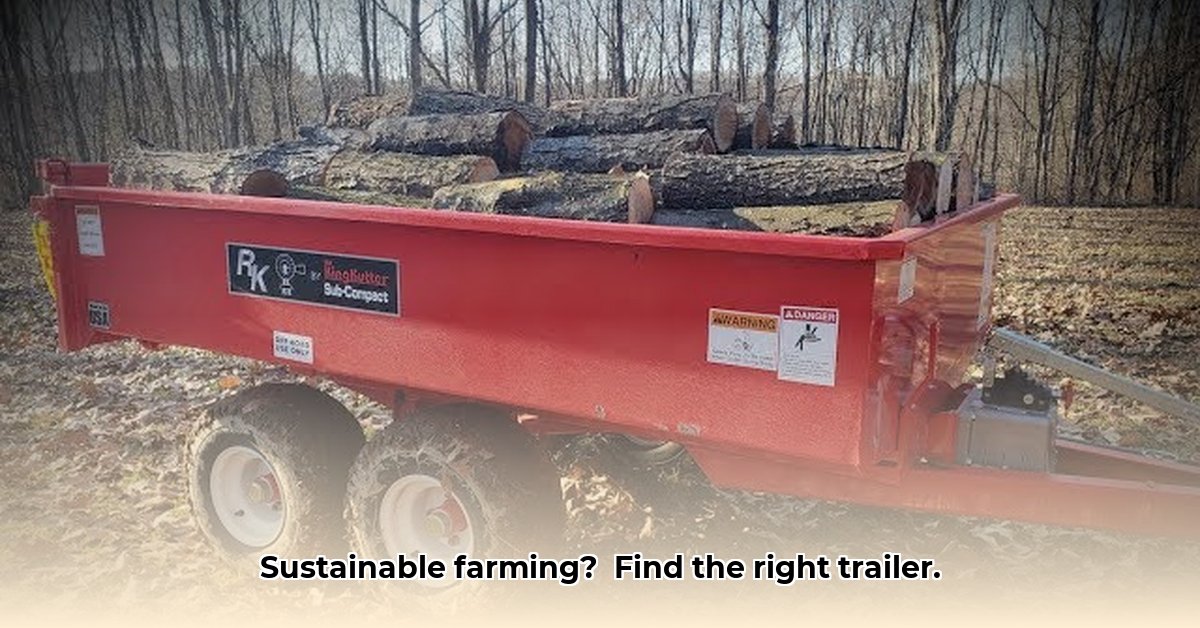
Dump Trailer Tractor Supply: Your Partner in Sustainable Farming
Choosing the right equipment is vital for efficient and environmentally friendly farming. A strategically chosen dump trailer from Tractor Supply can significantly improve your farm's sustainability and profitability. Let's explore how. For more information on trailers in general, check out this helpful resource on tractor trailers.
Fueling Efficiency: Saving Money and the Planet
Fuel costs are a major expense for farmers. Every gallon saved translates to more profit and a smaller carbon footprint. A larger-capacity dump trailer from Tractor Supply reduces the number of trips to and from the field. Fewer trips mean less fuel consumed. Studies show that optimized transportation systems can decrease fuel consumption by 10-15%. Isn't that a significant saving you'd like to achieve?
Protecting Your Soil: Minimizing Compaction
Heavy machinery can compact soil, reducing its ability to retain moisture and nutrients. This negatively affects crop yields. Lighter-weight dump trailers, especially those made from advanced materials like aluminum, minimize compaction. Using an appropriately sized trailer helps avoid overloading, a major contributor to soil compaction. Experts recommend matching trailer size to typical load weight, protecting soil health.
The Long-Term Investment: A Durable Trailer's Environmental Impact
Investing in a high-quality dump trailer from Tractor Supply is a long-term commitment to sustainability. A durable trailer reduces the need for frequent replacements, minimizing waste and lowering your overall carbon footprint. It's responsible stewardship of resources and a smart financial decision for the future.
Choosing Your Perfect Tractor Supply Dump Trailer: A Step-by-Step Guide
Selecting the ideal dump trailer involves several key steps. Let's break them down for a seamless process:
- Assess Your Needs: What materials will you haul? (Hay, grain, manure etc.) What's the typical load size? What's your farm's terrain?
- Consider the Capacity: Choose a trailer with ample capacity to avoid overloading. Overloading causes damage and increases soil compaction. Select a trailer that can handle your heaviest anticipated loads.
- Evaluate the Materials: Research different materials. Steel is durable and affordable, while aluminum is lighter for reduced compaction. Both are recyclable, but aluminum boasts superior recyclability. Prioritize trailers made from recycled materials whenever possible.
- Check the Build Quality: Inspect welds, frames, and components. A well-built trailer ensures longevity, reducing the frequency of replacements. Inquire about warranties and expected lifespan from Tractor Supply representatives.
- Explore Convenient Features: Consider sideboards to prevent spillage and ramps for efficient loading/unloading. These features enhance efficiency, saving you valuable time.
- Seek Farmer Feedback: Consult fellow farmers. Read online reviews and gather firsthand experiences with different trailer models. Word-of-mouth provides valuable insights.
Dump Trailer Materials: Weighing the Pros and Cons
The selection of trailer material significantly impacts sustainability. Let's compare common options:
| Material | Pros | Cons |
|---|---|---|
| Steel | Durable, strong, relatively inexpensive, widely recyclable, readily available | Heavier, may contribute to more soil compaction, susceptible to rust and corrosion |
| Aluminum | Lighter weight, minimizes soil compaction, corrosion-resistant, recyclable | More expensive upfront, can be dented more easily, might require specialized repairs |
The most sustainable choice is a trailer that meets your needs and provides long-term service. Ongoing research into new, more sustainable materials might further refine these options in the future.
How to Choose a Sustainable Dump Trailer for Eco-Friendly Farming
Choosing the right dump trailer directly impacts both your farm's environmental footprint and its financial health. Let's delve into making an informed decision.
Understanding Your Needs
Before selecting a specific trailer, carefully analyze your farm's unique requirements. What will you transport? How often? What are the typical distances? This assessment will guide your choice towards the most appropriate trailer.
Material Matters: Aluminum vs. Steel
The choice between aluminum and steel significantly impacts your operation’s sustainability. Aluminum trailers are lighter, leading to improved fuel efficiency—potentially a 10-15% reduction in fuel costs over the trailer's lifespan. Their lighter weight also reduces stress on your tractor or truck, extending its life. Aluminum is highly recyclable, minimizing waste. However, the upfront cost is generally higher.
Steel trailers, especially those using recycled steel, provide a lower initial investment. Their heavier weight, however, negatively impacts fuel efficiency. The sustainability of steel options depends heavily on the percentage of recycled content. Look for manufacturers with a strong commitment to recycled materials.
Durability and Lifespan: A Long-Term Investment
A durable trailer is an investment in long-term sustainability. It reduces the need for frequent replacements, minimizing waste. Consider the trailer's construction, material strength, and the manufacturer's reputation. Check warranties and customer reviews for insights into reliability and longevity. Choosing a sustainable dump trailer means ensuring it will serve you for years.
Beyond the Basics: Additional Considerations
Beyond material and durability, several other factors contribute to a trailer's sustainability:
- Tires: Opt for fuel-efficient tires suited to your terrain and hauling needs. Maintaining proper tire inflation is crucial for maximizing fuel economy and tire lifespan.
- Maintenance: Regular maintenance—including lubrication, inspections, and timely repairs—is essential for extending the trailer's lifespan and optimizing fuel efficiency.
- Features: Some trailers offer features that enhance sustainability, such as aerodynamic designs for reduced fuel consumption or innovative suspension systems that minimize wear and tear.
Making the Decision: Weighing the Pros and Cons
| Feature | Aluminum Trailer | Steel Trailer |
|---|---|---|
| Upfront Cost | Higher | Lower |
| Fuel Efficiency | Significantly Better | Lower |
| Recyclability | Excellent | Good (dependent on recycled content percentage) |
| Durability | Excellent | Good |
| Weight | Lighter | Heavier |
| Long-term Cost | Potentially Lower (due to fuel savings) | Potentially Higher (due to higher fuel costs) |
Remember to compare quotes from multiple suppliers and consider all costs, including maintenance and potential resale value, when making your decision. A sustainable choice delivers long-term environmental and financial benefits.